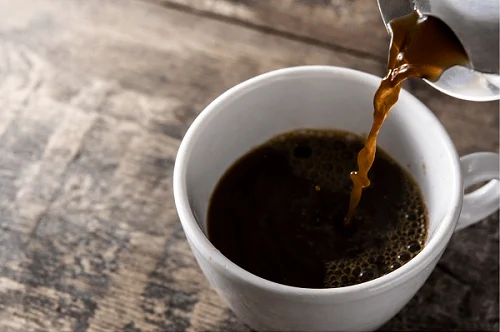Coffee
Why Fresh Coffee Is the Better Coffee
Coffee is a beloved beverage enjoyed by people all over the world. There are many reasons why coffee is so popular, including it’s rich flavor, energizing properties, and social aspect. However, one of the most important factors that contribute to the quality of coffee is its freshness. In this blog post, we will explore why fresh coffee is the best coffee and why coffee lovers prefer it over stale coffee. We will also provide a brief overview of the benefits of fresh coffee.
What is Fresh Coffee?
It refers to coffee that has been recently roasted and prepared for consumption. The flavor and aroma of fresh coffee are at their peak, providing a rich and full-bodied taste. To understand the concept of fresh coffee, it is important to understand how coffee becomes stale.
How Coffee Becomes Stale:
After coffee beans are roasted, they begin to release carbon dioxide gas. This process, known as degassing, lasts for several days after roasting. During this time, the coffee beans are at their freshest and provide the best flavor and aroma. However, as the degassing process continues, the coffee beans begin to lose their freshness.
Exposure to air is the main culprit behind coffee going stale. As the beans release carbon dioxide, they also absorb oxygen from the air. This causes the coffee beans to oxidize and lose their flavor and aroma. In addition, exposure to light, moisture, and heat can also contribute to coffee going stale.
Comparison of Fresh Coffee vs Stale Coffee:
This is characterized by its rich flavor, strong aroma, and bold taste. It has a lively acidity and a smooth finish, providing a delightful drinking experience. Stale coffee, on the other hand, has a flat, dull taste with a muted aroma. It lacks the richness and complexity of fresh coffee and can be bitter or sour.
Fresh coffee is also more nutritious than stale coffee. The natural oils and antioxidants in coffee beans begin to break down as they go stale, reducing their health benefits. Fresh coffee provides a higher concentration of these beneficial compounds, making it a healthier option.
Benefits of Fresh Coffee:
Fresh coffee offers a variety of benefits over stale coffee. Here are some of the key benefits of drinking fresh coffee:
- Enhanced Flavor and Aroma: Fresh coffee has a rich, full-bodied flavor with a strong aroma. The flavors and aromas of fresh coffee are more pronounced and nuanced than those of stale coffee, making for a more enjoyable drinking experience.
- Higher Caffeine Content: Fresh coffee contains more caffeine than stale coffee. Caffeine is a natural stimulant that can improve mental alertness and physical performance. By drinking fresh coffee, you can enjoy the benefits of caffeine without having to drink as much coffee.
- Healthier Choice: Fresh coffee is a healthier choice than stale coffee. Coffee is naturally high in antioxidants, which can help protect against a variety of health conditions, including cancer, heart disease, and Alzheimer’s disease. Additionally, fresh coffee contains more of these beneficial compounds than stale coffee.
- Increased Antioxidants: Fresh coffee contains more antioxidants than stale coffee. Antioxidants are natural compounds that help protect the body against damage from free radicals, which can contribute to a variety of health conditions. By drinking fresh coffee, you can increase your intake of these beneficial compounds.
How to Keep It Fresh:
Now that we understand the importance of fresh coffee, let’s explore some tips on how to keep coffee fresh. Proper storage is key to maintaining the freshness and flavor of the coffee. Here are some tips to help you keep your coffee fresh:
- Store coffee in an airtight container: Exposure to air is the main cause of coffee going stale. To prevent this, store your coffee in an airtight container. This will help to keep oxygen out and preserve the flavor and aroma of the coffee.
- Keep coffee away from light: Exposure to light can also cause coffee to go stale. Store your coffee in a dark place, such as a pantry or cupboard, to protect it from light.
- Avoid storing coffee in the refrigerator or freezer: Contrary to popular belief, storing coffee in the refrigerator or freezer is not a good idea. This can cause the coffee to absorb moisture and odors from the surrounding food, which can negatively impact its flavor.
- Only grind what you need: Grinding coffee releases its oils and aromas, which can quickly dissipate if not used right away. To ensure the freshest flavor, only grind the amount of coffee you need for each brewing session.
Storage Best Practices:
In addition to the tips above, there are a few other best practices to keep in mind when storing coffee:
- Buy coffee in small batches: Coffee is at its freshest in the days following roasting. To ensure that you are always brewing fresh coffee, buy coffee in small batches that you can use up within a week or two.
- Keep track of the roast date: Make sure to keep track of the roast date of your coffee. This will help you to know when it is at its freshest and when it is time to buy a new batch.
- Avoid storing coffee near strong odors: Coffee can absorb strong odors from its surroundings, so it is best to store it away from other strong-smelling foods or products.
Brewing Fresh Coffee:
Once you have your freshly roasted and properly stored coffee beans, it’s time to brew a delicious cup of coffee. There are many methods of brewing coffee, but some methods are better suited for preserving the freshness and flavor of the coffee. Here are some methods of brewing fresh coffee:
- Pour-over brewing involves slowly pouring hot water over coffee grounds in a filter. This method allows for precise control over the brewing process and produces a clean, flavorful cup of coffee.
- French press brewing involves steeping coffee grounds in hot water and then pressing the grounds to the bottom of the pot with a plunger. This method produces a rich, full-bodied cup of coffee with a lot of flavors.
- Aeropress brewing involves steeping coffee grounds in hot water and then using air pressure to extract the coffee. This method produces a clean, smooth cup of coffee with a lot of flavors.
Brewing Tips for Fresher Coffee:
In addition to choosing the right brewing method, there are a few other tips to keep in mind when brewing fresh coffee:
- Use the right water temperature: Using water that is too hot can result in over-extracted, bitter coffee while using water that is too cold can result in under-extracted, weak coffee. The ideal water temperature for brewing coffee is between 90°C and 96°C.
- Use the right grind size: The right grind size depends on the brewing method you are using. For example, pour-over brewing requires a medium-fine grind, while French press brewing requires a coarse grind.
- Brew in small batches: To ensure the freshest and best-tasting coffee, brew in small batches that you can drink right away. Avoid leaving brewed coffee sitting on a hot plate or in a carafe for extended periods of time.

